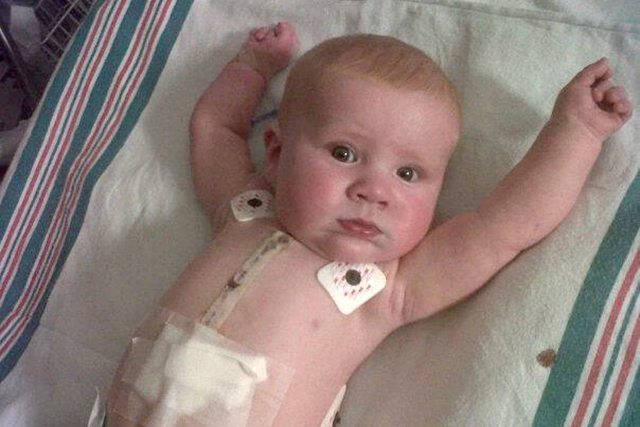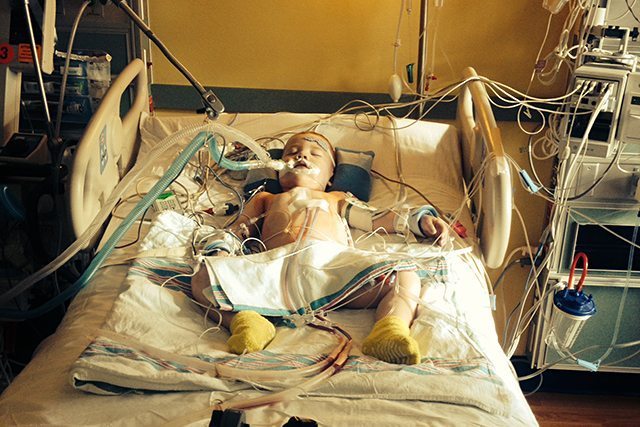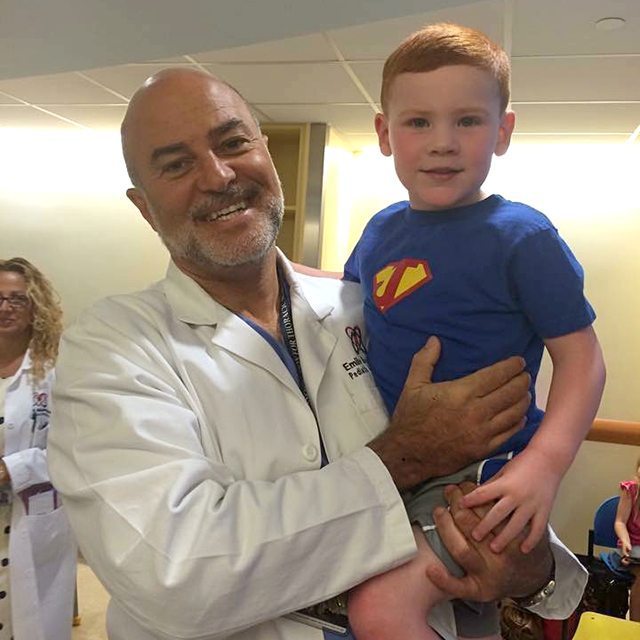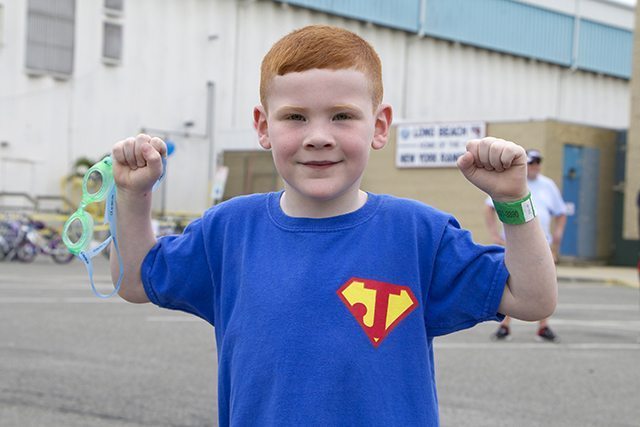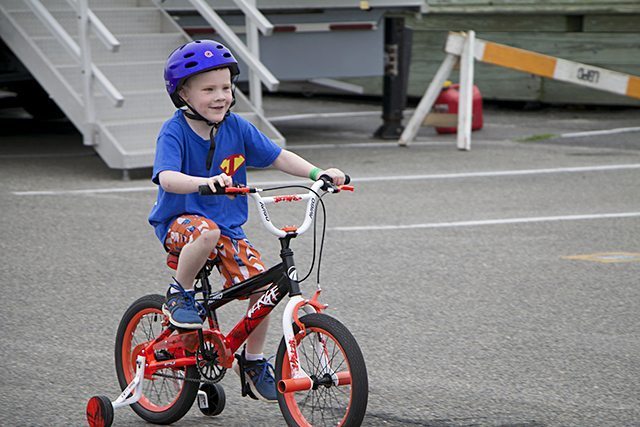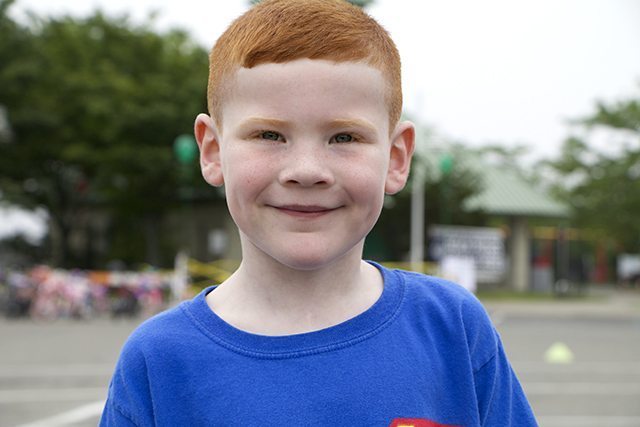Amazing Things: Jack Foley
Born with half a heart, this courageous 6-year-old beat the odds thanks to his drive and his surgical team at NewYork-Presbyterian Morgan Stanley Children’s Hospital.
“Swimmers, take your mark!” called the lifeguard.
Six-year-old Jack Foley pushed off the indoor pool wall and swam to the other end as fast as he could with his mom by his side to help him. Climbing out of the pool, he slid into his flip-flops, darted outside, toweled off, and mounted his new bike, a birthday present, for the next leg of the race. After pedaling around an obstacle of orange cones, Jack hopped off his bike and ran toward the nearby baseball diamond. Sprinting around the bases, he finished the race, crossing home plate with a giant grin on his face.
“Can you believe we are here watching this?” asked his grandmother, Pat Kiefer, a few minutes later, as race organizers draped a medal around Jack’s neck while his family cheered.
Completing the Long Beach Kids Triathlon in Long Beach, New York, this summer wasn’t the first victory in Jack’s young life. That’s because Jack was born with half a heart.
“He doesn’t even realize how amazing it is that he can do this,” says his mom, Lauren Kiefer-Foley, a special education teacher. “We didn’t think he’d come home from the hospital, and here he is.”
Life-Changing News
When Lauren was five months pregnant, she and her husband, Rob Foley, a firefighter, learned their son had a rare congenital heart defect called hypoplastic left heart syndrome (HLHS), a condition in which the left side of the heart fails to develop. Doctors gave the Long Island couple a grim picture of what their baby’s life would be like: They predicted Jack would not meet his developmental milestones and might not even survive. Several doctors advised them to end the pregnancy. Then Lauren’s family cardiologist said if he were in their situation, he would take his child to see Dr. Emile Bacha, chief of the Division of Cardiac, Thoracic and Vascular Surgery at NewYork-Presbyterian/Columbia University Irving Medical Center. Dr. Bacha is a pioneer in developing advanced, minimally invasive techniques for correcting congenital heart defects. He had hope for the Foleys.
“It’s a very severe malformation to be missing the left side of the heart, which is the most important half, but we treat this condition here at NewYork-Presbyterian Morgan Stanley Children’s Hospital very successfully,” says Dr. Bacha, who sees about 20 to 40 cases a year. “It’s not uncommon for people to come to us without hope, and that we can help them. I was honest with the Foleys and told them what I could promise them is that our team was going to do everything we could to give Jack the best chance at a healthy life.”
In Jack’s case, Dr. Bacha planned a three-step procedure that has been used to treat children with HLHS since the early 1980s, and designed to create normal blood flow into and out of the heart.
“Essentially, the surgeries reroute the plumbing inside of the heart so that a child with HLHS can use the right ventricle as the main pump of the heart to make up for the absence of the left,” says Dr. Bacha. He performs 40 to 60 of these surgeries each year.
These are the cases we live for and keep us going. When we see Jack doing so well, it makes us even more energized to help the next baby we see.
Dr. Emile Bacha
Four days after Jack’s birth on April 25, 2011, Dr. Bacha performed the first surgery, called the Norwood procedure, inserting a shunt in Jack’s heart to keep it open for blood flow. When Jack was 4½ months old, Dr. Bacha performed the second surgery, the Glenn procedure, to remove the shunt and reroute blood flow. At age 2½, the third surgery, called the Fontan, completed circulation throughout Jack’s body. Though the procedures are complicated, Jack did well through each one, earning him the nickname “Super Jack” among his NewYork-Presbyterian care team for his resilience and strong recovery.
“Doctors told us to prepare for six to eight weeks in the neonatal intensive care unit after the first surgery, but he was home within a week and a half,” says Lauren.
A Well-Earned Victory
Today, Jack is so active he didn’t need to change much in his routine to prepare for the mini-triathlon. Jack plays ice and roller hockey, and Little League baseball for his hometown of Franklin Square. He loves to swim in his backyard pool, which he jumped into frequently to train as the race day neared.
“Here is a kid who is living a normal life, after once being told there was nothing that could be done,” says Dr. Bacha. “The fact that he is playing ice hockey and completing a kids’ triathlon tells us it is a complete success. These are the cases we live for and keep us going. When we see Jack doing so well, it makes us even more energized to help the next baby we see.”
Jack and his cousin, Michael, also 6, do nearly everything together, and decided they’d take on the triathlon. The boys wanted to do it for their uncle Michael Kiefer, a firefighter who was killed on Sept. 11, 2001, just days after completing a triathlon.
“I wanted to make my uncle Michael proud of me,” says Jack.
After the race, Jack and his family headed to Red Mango to celebrate with Jack’s favorite dessert — cookies-and-cream frozen yogurt with sour gummy worms on top.
“There aren’t enough words to describe what Dr. Bacha means to us,” says Lauren. “He gave us our son. If it weren’t for him and his skill and knowledge and the care that Jack was given during his recovery, he wouldn’t be here doing this.”
Jack’s triathlon medal now hangs on his bedroom shelf, alongside his roller hockey trophy. Lauren anticipates more awards for victories to come.
“We’re going to need to build more shelves in his room,” she says.

